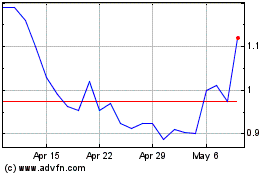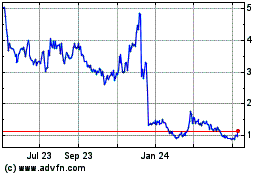GlaxoSmithKline: Study Shows Blood Cancer Drug Works in Heavily Treated Patients
December 16 2019 - 6:59PM
Dow Jones News
By Carlo Martuscelli
GlaxoSmithKline PLC (GSK) said Monday that its investigational
treatment belantamab mafodotin produced positive results in
patients with multiple myeloma who had undergone numerous other
lines of therapy.
According to data from the Phase 3 clinical trial, 31% of
patients who were administered the drug--also known as
GSK2857916--responded to the treatment.
Patients enrolled in the Dreamm-2 study had an advanced form of
the blood cancer, having undergone a median seven prior lines of
treatment, the British drug maker said.
Head of oncology research Axel Hoos said the results burnished
the company's in-house innovation. Glaxo sold its original cancer
drug portfolio to Novartis in 2016. At the time, belantamab
mafodotin was one of the early stage assets that was left
behind.
Since then the company has moved back into oncology. Mr. Hoos
said that while previously the company pursued a more cautious
approach, preferring compounds with a moderate profile, it had
pivoted to a high-risk and high-reward innovation-focused
strategy--with antibody drug conjugate belantamab mafodotin one
result of this shift.
Glaxo said it is initially pursuing approval from the U.S. Food
and Drug Administration as a treatment for multiple myeloma in
patients that have undergone four lines of therapy or more, with a
decision expected at some point next year. A number of other trials
are underway to secure indications in earlier stages of
therapy.
Mr. Hoos said, if approved, the initial addressable patient
population for belantamab mafodotin will number 10,000 in fourth
line or more for the U.S., Europe and Japan, with the figure
reaching 65,000 possible patients in first line.
However, the drug will be competing in what could become a
crowded field. Earlier in the month, Bristol-Myers Squibb Co.
(BMY), together with partner Bluebird Bio Inc. (BLUE), made public
positive results from a Phase 2 study investigating their CAR-T
therapy in patients with relapsed and refractory multiple
myeloma.
Another approach, known as bispecific antibodies, is also being
tested in multiple myeloma both by BMS and rival Regeneron
Pharmaceuticals Inc. (REGN).
Mr. Hoos said while the overall response rate of CAR-T therapies
in multiple myeloma had been high, duration of response wasn't
stellar, and there were challenges with scalability and patient
access.
Meanwhile, Glaxo's treatment was relatively easy to produce and
to test in clinical trials, with rapid uptake expected, he
said.
Belantamab mafodotin combines an cancer-targeting antibody with
a toxic drug to destroy cancer cells.
"This is potentially the next big thing in multiple myeloma,"
Mr. Hoos added.
(END) Dow Jones Newswires
December 16, 2019 18:44 ET (23:44 GMT)
Copyright (c) 2019 Dow Jones & Company, Inc.
bluebird bio (NASDAQ:BLUE)
Historical Stock Chart
From Mar 2024 to Apr 2024

bluebird bio (NASDAQ:BLUE)
Historical Stock Chart
From Apr 2023 to Apr 2024
